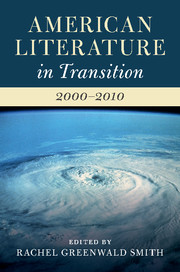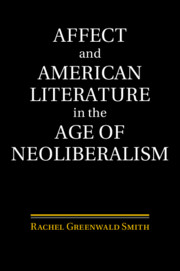31 results
Part III - Digital Revolutions
-
- Book:
- American Literature in Transition, 2000–2010
- Published online:
- 14 December 2017
- Print publication:
- 28 December 2017, pp 179-236
-
- Chapter
- Export citation
Copyright page
-
- Book:
- American Literature in Transition, 2000–2010
- Published online:
- 14 December 2017
- Print publication:
- 28 December 2017, pp iv-iv
-
- Chapter
- Export citation
Acknowledgments
-
- Book:
- American Literature in Transition, 2000–2010
- Published online:
- 14 December 2017
- Print publication:
- 28 December 2017, pp ix-x
-
- Chapter
- Export citation
Chapter 12 - Manifestos
- from Part II - Forms
-
-
- Book:
- American Literature in Transition, 1990–2000
- Published online:
- 11 December 2017
- Print publication:
- 28 December 2017, pp 185-198
-
- Chapter
- Export citation
Part I - Formal Transitions
-
- Book:
- American Literature in Transition, 2000–2010
- Published online:
- 14 December 2017
- Print publication:
- 28 December 2017, pp 15-106
-
- Chapter
- Export citation
Afterword
-
-
- Book:
- American Literature in Transition, 2000–2010
- Published online:
- 14 December 2017
- Print publication:
- 28 December 2017, pp 385-390
-
- Chapter
- Export citation
Index
-
- Book:
- American Literature in Transition, 2000–2010
- Published online:
- 14 December 2017
- Print publication:
- 28 December 2017, pp 391-402
-
- Chapter
- Export citation
Part VI - Institutional Shifts
-
- Book:
- American Literature in Transition, 2000–2010
- Published online:
- 14 December 2017
- Print publication:
- 28 December 2017, pp 343-384
-
- Chapter
- Export citation
Part V - The Ecological Turn
-
- Book:
- American Literature in Transition, 2000–2010
- Published online:
- 14 December 2017
- Print publication:
- 28 December 2017, pp 289-342
-
- Chapter
- Export citation
Contents
-
- Book:
- American Literature in Transition, 2000–2010
- Published online:
- 14 December 2017
- Print publication:
- 28 December 2017, pp v-vii
-
- Chapter
- Export citation
Introduction
-
-
- Book:
- American Literature in Transition, 2000–2010
- Published online:
- 14 December 2017
- Print publication:
- 28 December 2017, pp 1-14
-
- Chapter
- Export citation
Part IV - Transnational Currents
-
- Book:
- American Literature in Transition, 2000–2010
- Published online:
- 14 December 2017
- Print publication:
- 28 December 2017, pp 237-288
-
- Chapter
- Export citation
Part II - The Return of Authenticity
-
- Book:
- American Literature in Transition, 2000–2010
- Published online:
- 14 December 2017
- Print publication:
- 28 December 2017, pp 107-178
-
- Chapter
- Export citation
Figures
-
- Book:
- American Literature in Transition, 2000–2010
- Published online:
- 14 December 2017
- Print publication:
- 28 December 2017, pp viii-viii
-
- Chapter
- Export citation

American Literature in Transition, 2000–2010
-
- Published online:
- 14 December 2017
- Print publication:
- 28 December 2017
Epilogue
-
- Book:
- Affect and American Literature in the Age of Neoliberalism
- Published online:
- 05 May 2015
- Print publication:
- 20 April 2015, pp 127-130
-
- Chapter
- Export citation
4 - Ecology, Feeling, and Form in Neoliberal Literature
-
- Book:
- Affect and American Literature in the Age of Neoliberalism
- Published online:
- 05 May 2015
- Print publication:
- 20 April 2015, pp 100-126
-
- Chapter
- Export citation
1 - Personal and Impersonal: Two Forms of the Neoliberal Novel
-
- Book:
- Affect and American Literature in the Age of Neoliberalism
- Published online:
- 05 May 2015
- Print publication:
- 20 April 2015, pp 30-60
-
- Chapter
- Export citation
Introduction - The Affective Hypothesis
-
- Book:
- Affect and American Literature in the Age of Neoliberalism
- Published online:
- 05 May 2015
- Print publication:
- 20 April 2015, pp 1-29
-
- Chapter
- Export citation

Affect and American Literature in the Age of Neoliberalism
-
- Published online:
- 05 May 2015
- Print publication:
- 20 April 2015



